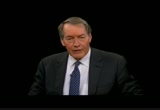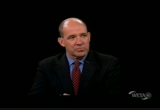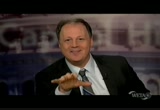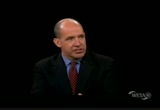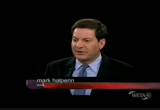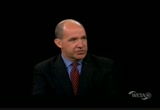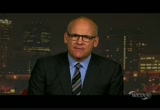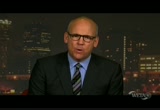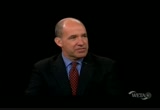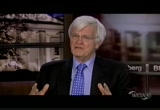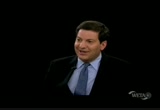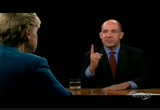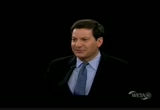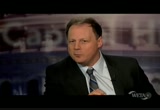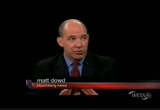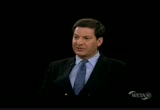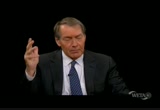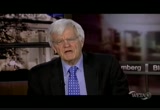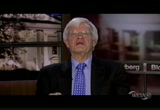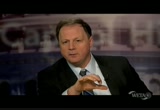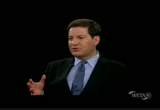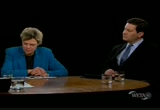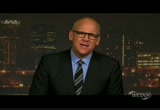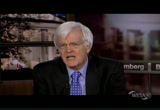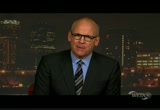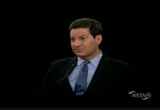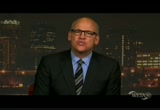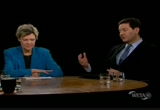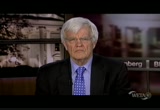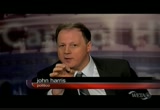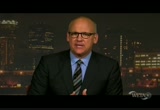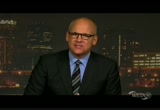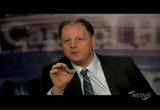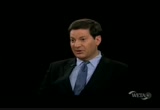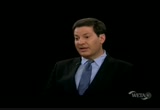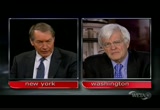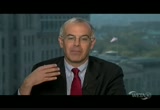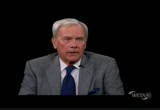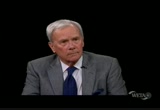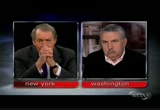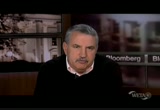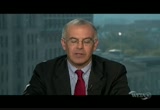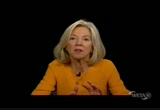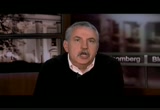tv Charlie Rose PBS November 6, 2012 12:00am-1:00am EST
12:00 am
john harris, mark halperin and john heilemann. >> i would say when you have a democratic president getting a lower percentage of the white vote than george bush got in 2004, your election of t hispanic vote, that's also a big structural problem. the promise of barack obama in 2004, just to state the obvious, when he first sprang on national attention with the "we're not red america, we're not blue america, we're not white, we're not black" that's been eviscerated. we clearly have an electorate that's divided in long term structural ways along racial lines. >> and regional lines. >> and the goal of either party would be -- and gender lines and the goal of either party would beos>>ne: rle a >> rose: an election preview when we continue.
12:02 am
from our studios in new york city, this is charlie rose. >> rose: tonight we enter the final hours of 2012's presidential election. tuesday may be the main event but tens of millions have already voted. reduction of early voting hours in key states have raised questions about the propriety of campaign tactics. both sides are preparing for possible legal challenges in a sign that the contest might continue beyond election day. president barack obama and governor romney have spent the day drumming up last-minute support in battleground states. >> you may be frustrated at the pace of change. i promise you, so am i sometimes. but you know that i say what i mean and i mean what i say. (cheers and applause) i said i'd tend war in iraq and i ended it. i said i'd pass health care reform. i passed it. (cheers and applause) i said i'd repeal "don't ask, don't tell." we repealed it. (cheers and applause)
12:03 am
i said we'd crack down on reckless practices on wall street and we did. (applause) so you know where i stand. you know what i believe. you know i tell the truth. and you know that i'll fight for you and your families every single day as hard as i know how. you know that about me. (cheers and applause) >> you see, talk is cheap but a record, that's real and it's earned with real effort. (cheers and applause) i mean, the president promised a lot of change, but change can't be measured in speeches, it has to be measured in achievements and four years ago candidate obama promised to do oh so very much but he's fallen oh so very short. i mean, you know some of these things. he said he'd be a post-partisan president, but he's been most partisan. attacking, blaming.
12:04 am
it's not only republicans he's refused to listen to, he refused to listen to independent voices. he was going to focus on creating jobs. instead he focused on obamacare and that killed jobs. he was going to cut the federal deficit in half, instead he doubled it. >> rose: joining me from washington, d.c. is albert hunt of bloomberg news and john harris of politico. from des moines, iowa, john mile man. in new york, mark hall prin, cokie roberts and mat dowd of abc news and bloomberg news. i'm pleased they have them back on this program. we go to washington and albert hunt. where are we? >> charlie, i think that the fat lady is started to sing. it looks like things are moving in a very, very slow but steady direction in barack obama's favor both in the popular vote and the electoral vote. i base that on the polls, to be sure. also talking to both sides today i think's clearly more confidence in the obama camp.
12:05 am
i think this is one of those great elections. there are very few of them, 2004 and 2000 were two where you aren't certain who is going to win but certainly all signs are pointing to a small obama victory tomorrow. >> rose: john harris? >> i agree with that if you look at these numbers and you look at the electoral college landscape and through any conventional prism what al said is completely true. the only caution i would make is this has not been a year in which the conventional prism has been especially reliable so it's a little late to start applying a conventional analysis now. >> rose: (laughs) cokie roberts? >> you know, what obama is concerned about is exactly this conversation as he said today "i have enough voters if they get out and vote." when you look at it, our crack pollster at abc did an analysis that says the average difference between these candidates since september is one tenth of one
12:06 am
percent which is the closest it's been since pre-election polling started in 1936. so there's reason to believe it's still a very close election. i agree it's breaking in the president's favor but it's -- it could go either way. >> rose: breaking in the president's favor? >> yeah, this is not a dead even race which it keeps getting described and there has not been inconsistency in the polling in this race from the beginning if you throw out outliers and look at the all-encompassing part of this polling. this race so much mirrors 2004 and the reelection of george w. bush but the difference in this race is there's more data points to look at so there's a clear indication this time of what's about to happen than in 2004 and what ultimately ended up happening. but if you look at the preponderance of the evidence and all of this stuff-- and it's not fully conventional wisdom, just data points and all of the data points, in the history of this polling in the modern presidential campaign it is prom -- the preponderance of the evidence has never been wrong. there's never been a time when the election day was different
12:07 am
than the preponderance of the evidence. could it happen once in -- yes, it could possibly happen. but as of right now this is a close race but i think it's ultimately going to be a convincing victory by president obama. it will be close but it will be convincing. >> rose: mark halperin, do you concur? >> i think the winner of ohio will win and there's more reason to think the president will win ohio than governor romney will. there's the question of what the electorate will be like and you can be a great pollster and make assumptions about the electorate and be wrong. so governor romney continues to do well with n a lot of polls with independents. going out on the trail you can't help but see there's more enthusiasm for him than there was for john kerry and then there was for john mccain. and there's racial politics here because we have to see what the makeup of electorate is and the share of the white vote the president gets but i think the winner of ohio will win and like i said i think the president is more likely to win ohio but i don't rule out the romney campaign is right that the electorate that shows up tomorrow in ohio will be
12:08 am
different than what people are expecting. >> rose: how different? >> whiter. >> whiter and with -- whiter and with the president getting a significantly meaningfully significantly lower percentage of the white vote than he got in ohio four years ago. >> the problem in my view with the romney explanation -- and i agree, all that could happen. but the problem with the romney explanation is their message seems to be "are you going to believe me or your lying eyes?" because they have one pollster that says it's this way and 25 other pollsters that say it's opposite. so you have to sort of say what would you bet on? 25 people that say it's one way or one person who gets paid who gets a check every week from the romney campaign that says it another. >> yes, they said internal polls show we're winning this thing. >> signs of a campaign that is about to go to defeat, when you start talking about internal polling, when you say you're going to change the composite of the electorate and when you stay only poll that counts is on
12:09 am
election day, that means you're not in a good place. >> how many of the public ohio polls was the president wining with independents? >> see, to me the independent number doesn't matter. it's as if you're saying watch the independent number but don't look at the overall number and you can't say a poll is accurate for a subgroup but inaccurate for its overall number. that's the problem. >> there is different ways of looking at the electorate. you can look at it as a partisan electorate, how many democrats, republicans and independents or you can look at it as a racial and sex electorate and clearly the percentage of non-whites voting goes up and the percentage that the president is getting among non-whites is overwhelming. absolutely overwhelming and i am very curious to see what happens now among women married women have not gone off the president the way married splen in the polls and i think-- and i have nothing to back this up until they vote tomorrow and we see the exit polls-- but.
12:10 am
>> rose: or even then. >> we'll get a better sense, though. for years people have talked about the women's vote and abortion, it's never been true, it's a phony baloney argument. but this year the whole combination of conversation about contraception and planned parenthood and legitimate rape could have women feeling that this is a party where they are not welcome and if that's the case and you get more women voting democratic and non-whites that's the way to look at the electorate rather than thinking about independents. >> rose: is ohio different than other states because of the auto bailout? >> because of that and the messaging on bain capital as well. the reason governor romney's put himself in a bad position is he left himself vulnerable to paid media and the democrats hitting hard -- >> rose: back in august? >> before august, they were doing it last year that he's an outsourcer, someone who's callous about laying people off
12:11 am
and that he didn't want to save the auto industry. >> rose: let me get john in. ohio, when you look at the polls so far do you agree with everything people have said? >> >> i do, charlie, i agree with everything everybody said. i'll add a couple things. i've been out for the last few days with the romney and obama campaign. someone mentioned the fact that the obama campaign seems more confident than the romney campaign does and i think that's true. they're very confident about ohio. they're more confident about a few other states. they look at iowa, they look at wisconsin nevada and new hampshire and they think those states are in their column. they're incredibly confident as of this moment that they look at ohio and that's the next highest level of confidence they have what mark said is right. they feel the bain ads did damage to romney. we're going to look back one day on the fact that governor romney wrote his op-ed in the "new york times" that said "let detroit go
12:12 am
bankrupt." he wrote that op-ed in november of 2008 right at the end of -- right after the presidential campaign in 2008, long before he was an announced candidate and it could been the most important thing to his detriment that he did. he did it almost four years ago but it's been very hard for him to overcome that. it's also the case that ohio is different in the sense that the white working class voters in ohio are more unionized than any other state in the country and what we're seeing across the midwest is that white working class voters in the northwest the rust belt are just different in terms of their attitude towards president obama than white working class voters in the south and in appalachia and other parts of the country and they are -- they voted for him in greater numbers in 2008 and according to the polling internally that both labor has done and the obama campaign has done they're still voting for him out of proportion with the way that that economic and racial cohort supports the president almost anywhere else in the country. >> rose: is ohio in a better place for the president because the economy of ohio seems to be turning around?
12:13 am
>> among the people who say the economy is poor, in 200866% of them voted for obama. in 2012 in an average of our polls 18% of them say they're voting for obama. that's the kind of dropoff you can't sustain. the difference is there aren't as many of them as there were. >> presidential campaigns -- i think we spend much too much time talking about tactics -- >> one second, al. >> we spend too much time talking about the importance of tactics or what happened and the fundamentals of the political environment and the dynamics of the country for a reelection of a president is much more important than this the dynamics of ohio and the economy in ohio has more to do with how the president is doing in ohio than any tactical thing either campaign has done and that dynamic is set. the other dynamic that's pretty much set and something that i kept telling people to look at in 2004 was the president's job approval number and the president's job approval number today is in two polls that came out today, 51% and 52%. no president has lost reelection
12:14 am
when their job approval number has been over 50%. >> rose: but wasn't it below 50% two months ago. >> yeah, it was for a long time. >> pretty close. >> it's now slightly above where george w. bush's was when he was reelected. >> and that dynamic is more important than any tactic. >> rose: albert? >> charlie, there have been two other elements that have enabled obama to have a better close than romney. one was the storm. sandy. there's no question that happened. there's no question that the hug if you will, with governor christie played to what people wanted to see. i'm looking at the iowa poll that was done over the weekend. they asked the question "who's the stronger leader?" in iowa romney had a slight advantage, now it's obama 50% to 42%. i agree with what john said earlier. iowa and nevada have been put away. i don't think new hampshire and wisconsin have. but i think that's reflect in that poll. the second that's occurred is every single poll i've seen
12:15 am
shows more optimism about the economy than there was a month ago. not people aren't off the charts mind you, but a third of the people think the economy is in good shape. another 20% think it's getting in better shape and those are better numbers than the summer. >> rose: let me ask about florida, john harris, and pennsylvania. >> it looks like florida is most likely in romney's camp. not certain. it seems to me that if obama wins florida he's going to win a bunch of other states and we'll have a map that looks more like 2008 than we've been thinking this last month or so where hi would win most of the state he is won in 2008 minus north carolina and indiana. that's an early night for us all. althoughs pennsylvania better than i do. i don't think it's been awe thenltally in play. i think there was a series of head fakes going on but that's never been a central battleground. >> rose: mark?
12:16 am
>> well, they're winning pennsylvania because this is the first campaign where no one has to make choices about money because they have enough to spend and they had extra money and there wasn't any other place to put and the public polls make it clear it's closer. the president will win by a more narrow margin than four years ago. i think that the -- i agree with matthew the fundamentals matter most of all. ohio is a tricky place, though, because while the economy is better than it was, still not particularly good. >> rose: is ohio enough for governor romney? >> if he wins the southern states and colorado it's enough. >> and i think one of the conversations maybe we'll have in the aftermath of this is one of the things he's had in ohio-- and it's the electoral problem that he has had-- is that the electoral college moved from an advantage they had to a democratic advantage. >> remember, the electoral college lock that republicans were supposed to have? >> and ohio is moving towards pennsylvania where it was always a swing state and it began to
12:17 am
lean democratic. ohio, i saw signs of this in 2004 when ohio if you changed 60,000 votes, if 60,000 people switched their vote, president obama would have won the election, popular vote, and lost the electoral college. it's slowly moving in that direction and no state is moving in the opposite direction. a long-term problem for republicans. >> but there are states that have swung in into the red column that were pla n play in years past. texas being an example. >> west virginia. >> but not in the last 15 years. one state, west virginia, is the only state and all the other states have switched the opposite way. >> well, we don't know which way inn zinn in the end. >> rose: was there genuine momentum going until hurricane sandy came along? >> i think obama would be winning but i think it would be less certain, i think it would be closer. i think sandy clearly gave a bump. >> one of the things the -- the abc poll that came out just now, today, 35% post-sandy have
12:18 am
strongly approved of the president's record and that's the highest since september of 2009. >> five point increase in five days. >> rose: five point increase strongly approve? >> and i think it changed -- it didn't change the electoral college, it changed the popular vote situation which i think on monday he would have lost. the president would have lost the popular vote and won the electoral college. i think now the president is likely to win both. >> here's one thing we can say for certainty. the governor romney loses many people around him will say we were on track to win this if not for the storm. >> rose: john harris? >> just to playoff matt's point. i agree republicans have the most obvious long-term demographic problem. i would have to say that when you have a democratic president getting a lower percentage of the white vote john george bush got in 2004 your election of the hispanic vote, that's also a big structural problem the promise
12:19 am
of barack obama in 2004, just to state the obvious, when he first sprang on national attention with the "we're not red america, we're not blue america, we're not white, we're not black" that's been eviscerated. we clearly have an electorate that's divided in long-term structural ways on racial lines and... >> and regional lines. >> and i think the goal of either party would be engendered -- would want to be to change that. my question for republicans is where is the republican bill clinton who's going to play against type and my question for barack obama is why didn't he embrace some of clinton's message earlier than the last three, four months of a campaign why did he allow his promise to get so diluted and the electorate to become so polarized. >> to answer your question second which you didn't ask, they do have a clinton in the wings. which could transcend some of those things eventually. >> no doubt she would be given precisely that critique. >> rose: where is is republican party and where is the democratic party and is the
12:20 am
democratic party -- because all the things we just said on the front edge of where the wave is having to do with the future. >> the 2016 race starts wednesday after the election for both sides and the nomination process. i think the democrats have to search for their post obama person, who that is. i think they have an easier time in the course of this if they win and do that. i think hillary clinton is an obvious question that has to be answered before everybody else pivots off of that. i think the republican party is going to be in an incredible civil war. you're going to have very conservative part of the party saying this is what happens when you nominate an inauthentic conservative. he was never conservative, we never trusted him and this is what happens. we need to nominate somebody who is a true blue conservative. the less conservative part -- i don't think there's a moderate -- are people who that say this is what happens when you veer too far. >> rose: people like jeb bush? >> and you can't do that in the primaries and i think they
12:21 am
thought president obama was ripe for the picketing, they lost the race and that battle is going to be -- it's going to play out in a very open, public, very bitter way. >> rose: i have to excuse you, matt dowd. mother abc is calling. >> the day before the super bowl it will be fun. (laughter) >> rose: go ahead. >> i think the republicans will be -- if governor romney loses in a situation annal us go to the democrats after the '88 election when there was a real question of what is our party going to be to win a presidential election again? they had bill clinton to lead that. ron brown as the chairman of the party. >> rose: in '88? >> from '88 to '92. it's not clear who that would be for the republicans. people talk about jeb bush, i'm not sure he's ready to take that on. there's no other obvious candidate to me right now the big issue now before we get to the elections starting in earnest-- though i agree it starts to some extent on
12:22 am
wednesday-- is the fight over the fiscal cliff which will really divide republicans in congress and people like mike huckabee and rick santorum and others who are thinking about running for president next time. people are going to have to choose up sides and if president obama is leading those negotiations it's going to be an obama deal so for a lot of republicans in congress and around the country they're against it no matter what. they don't care what percentage of the vote he got, how big his mandate is, they'll be against it because it will have revenue in it, new revenue, and they'll be against it. >> rose: because it is -- that vote is influenced by how they perceive the battle they are making for the control of the republican party? >> and they don't like him and anything he stands for and his victory won't change that. and choosing up sides there will tell you a lot about how people are going to approach going forward the next four years of an obama presidency and the fight to redefine the republican party. >> it's going to be -- i mean, regardless of what happens tomorrow i think we come out of this pretty much where we went into it and that's what makes it very disheartening, frankly, as
12:23 am
somebody who covers washington and tries to pay attention to what those people are going to be doing in the future. it's hard to see how anything shakes it loose. >> rose: two things. albert, when you look at -- let's assume that everything we've said here is right and the president is reelected. where's his mandate and what does he want to do with the country? >> i don't think if you look at this campaign you can claim he has any kind of a mandate. that's one of the disspiriting things about this campaign. but that goes to your point, charlie, i believe that the democrats looking ahead it will depend on how obama governs. can he do something with this fiscal cliff? is he going to govern the way he has in the past couple years or has he learned a lesson in it's just the familiar cast of characters i think the democrats are in for some tough trouble despite a pretty good win tomorrow.
12:24 am
so i think it depends on that. for republicans, my friend mark hal halperin is too young. it's not 1988, it's 1968. that civil war will be much biger than the democrats faced after the dukakis debacle. it will be bitter. not just jeb bush, paul ryan and marco rubio but for mike huckabee and rand paul it's really going to be ferocious. >> rose: so who is richard nixon in this? >> it's going to be fun. >> rose: what is richard nixon in this scenario, albert? >> who is richard nixon? well, he was -- >> mitt romney comes back? >> he was already president in '68 but the democrats went through the -- there was the john connolly wing nut before he became a republican, there was mcgovern, musky, so i think the -- it there's going to be the equivalent of that now. >> rose: john harris, do you have any sense of what the president -- has he thought about how he wants to ghovrn the second term or is he simply thinking about having an opportunity to govern in the second half. >> it's an opportunity.
12:25 am
and the way to look at the mandate is if he wins reelection, the republican mandate to stop him he hopes has been eliminated. probably what he wants to do is take up the unfinished agenda from 2011. that is get back the fiscal cliff, force both sides-- his theory is-- to deal with the so-called grand bargain on fiscal issues. and if that's right-- and i do think mark's analysis is right-- the two central figures to watch on the republican side are paul ryan. i think he is going to have a voice equal to if not superior to john boehner on this issue of can house republicans come along and mitch mcconnell who made it clear his overriding goal was to stop reelection. but if he fails in doing that is he going to say okay, it's now time to end that debate and resolve these things? but he's got a reelection coming up in 2014. those i think are the two figures in the washington drama, the ones al mentioned in the national drama are obviously there but i think the fiscal cliff issues come first.
12:26 am
and that's since i don't really agree with matt dowd that the 2016 election starts the day after. first off, hillary clinton is going to freeze issues for six months or perhaps two years while she decides on the democratic side and the fiscal cliff issues will take precedence over any other national issue on the republican side. >> rose: but the president clearly-- i've asked him this-- believes that elections have results and that this will be a different consideration of the fiscal cliff. >> a chastened republican party. >> that's what he says. he has said outloud for the record "if i win it will be a mandate for revenues." now i don't think the republicans believe that for a second. he also thinks that mitch mcconnell's famous statement about my number one job is to defeat the president, that will now be moot. and so that there will be a different dynamic in washington. i don't see any evidence of that. >> i don't see evidence of it, either, and i think his failure to build personal relationships with them and spending the last
12:27 am
year trying to define the election has left things in a bad state. his best friend is the fiscal cliff and the reality that there is a way to construct on paper that we can sit around this table and based on their public positions and what we think their political needs are, we can come up with a deal. tax reform -- >> everybody can. the math isn't that hard. >> rose: there's some variation of simpson-bowles. >> with different kinds of revenue in bowles-simpson and different revenue reduction and bowles-simpson didn't do social security and this i think will. if he does that it transforms things. he can move on to energy and other things. if he doesn't, i think he's got a crippled four-year presidency because it's hard to see how if he can't get that done and the implications of not getting it done, it's hard to see how he rebuilds. >> rose: for all of you in washington, has this been an all-time bad campaign? has this been one of the worst campaigns you've mean? al, what was the first campaign you covered? kennedy? nixon? >> i'm not that old, charles!
12:28 am
stop it, will you? look, i don't think this has been disease as i said earlier-- an edifying or inspiring campaign but most haven't been. >> right. >> let's not pretend that richard nixon's campaign suddenly galvanized america. >> rose: the silent majority. >> right and the reagan campaign in a 1908 was a little better. the clinton campaign in '92 a bit better but we usually don't have campaigns that are oxford debating societies. >> charlie, when james madison was running, the federalist press wrote that thomas jefferson had pimped dolley madison and her sisters in exchange for votes in congress so so it doesn't get much nastier than that. >> rose: nasty isn't an election. does this election decide any great themes? the role of government, those big questions? john heilemann. >> i agree we what all of the panelists have said about the nablgt we do see the past through rose colored glasses and glorify these campaigns to an excessive degree but i think
12:29 am
given the scale of the challenges of the country faces and the immediacy in terms of the fiscal cliff and other issues i think the campaign was small and arid and obviously incredibly negative and petty. i don't think it was a campaign that was worthy of governor romney. i don't think he ran a campaign worthy of himself. i don't think president obama ran a campaign worthy of himself or the scale the challenge the country faces. it was disspiriting for that reason. not because it was historically awful but because we are in a place where there are going to be -- the challenges are large and the kinds of sacrifices that the country will need to make and the kinds of ingenuity the country needs to bring to bear are historically large by -- and i think a relative context and to run this small ball seinfeldesque kind of campaign about nothing for most of the time, especially when the
12:30 am
ideological divisions between the parties are quite stark and large, for two figure heads to run this campaign was very disappointing and not one of them was up to the challenge. >> let me just at one surprise. i think it may be a different element and that is going to be immigration. i think if the latino vote goes over 70% for obama, if it makes a difference in colorado and nevada and maybe virginia i think republicans are going to have to have their own come to jesus session. they're going to have decide they can't keep fighting this and they're going to have go the same way george w. bush wanted to go and john mccain wanted to go. i think not because of the nature of the campaign but that may be one aftereffect of this campaign. >> rose: go ahead, john. >> i do want to throw out one other scenario here, which is the thing that actually president's people are most concerned about. i talked before about how confident they are about winning. what they are not at all confident about at this moment
12:31 am
is that they're going to win the popular vote so they think there's a reasonable chance-- and you can hear their nervousness about it-- that they will win the electoral vote and lose the popular vote. although that means barack obama wins the presidency, i think their fear as citizens not political operatives is that it will be horrible for the country. and there will be a lot of republican rejectionism that will say this is an illegitimate election, if mitt romney wins the popular vote and obama gets in by a hair on the electoral vote there are a lot of republicans who want to say barack obama is an illegitimate president and it will fuel that worse on the accusations about voter fraud will be widespread and it will be really really -- as hard as it will be to govern in any circumstances it will be remember thely hard to govern in those circumstances for the president. >> yeah, talk about no mandate. we're not just talking about -- you can say okay that happened in 2000. it wasn't an incumbent president. to have an incumbent president lose the popular vote and win the electoral college is very
12:32 am
problematic to put it mildly. and one of the things that could be a problem for shim the hurricane because the states of new york and new jersey and connecticut are democratic states and if those votes are suppressed because people can't get to the polls and don't get to the polls thatould hold down the popular vote. i think it's likely. i think he's likely to win votes but i think it's possible. >> if it happened he would have to fight a lot harder to save his second term than he's had to win reelection. >> rose: to save his second term and make it a term -- four years that he could be productive. to create a legacy. >> the fourth year of his first term has basically been -- and the same dynamic would perer vad and would be exacerbated if he lost. >> let me add one thing quickly to that to what mark and cokie were saying. the president got a huge boost in the popular vote in 2008 in blue states like new york and new jersey as cokie pointed out but also places like california which are states that he would
12:33 am
have won anyway but there was so much organic enthusiasm for barack obama in 2008 that he won -- that a lot of people turned out even in deep blue states where their votes, of course, didn't count, they turned out in mass numbers. the president's people knee this year that's not going to happen. so in terms of the overall national popular vote, if you think about red states and blue states where neither campaign is trying to turn out the vote, the blue states like california and new york for various reasons the president's numbers won't be anywhere near as strong as they were in 2008 whereas in the deep red state there is's so much antipathy towards the president that people will turn out in those states even though they are deep red states. they'll turn out the cast a symbolic vote against barack obama. so that's one thing that skews the popular vote by conceivably on election day towards romney more than people are necessarily expecting >> i think that's absolutely right. the red states are really, really red and they want to get out there and show how much they want to throw the president out. >> and that goes back to your question you asked before, how could a romney win happen given
12:34 am
the data we see? there are parts of ohio that are red states. southwestern, southeastern part of the state and if those people turn out to be more energized than the president's base supporters-- young people, african americans in cleveland and columbus-- then you could see a much closer race at least in ohio than the public polls show. we should say because we haven't mentioned it yet, if that happens given the way they count protestants in the state -- provisional ballots and absentee ballots we may not know. >> that would be november 17. >> and we could have a situation where he wins the three southern states and colorado and ohio are laying out there. >> which means we have to be looking closely at virginia. virginia early tomorrow evening the polls will close and if virginia goes for romney we could be in for a very long night. >> i absolutely agree because in some ways bain and the auto bailout aside virginia is a tougher state for governor romney because it has lots of young people, lots of suburban voters who are on social issues,
12:35 am
i think that's the one place where there are women's issues their agenda has worked well and hispanics and african americans so if governor romney wins that state it mean he is will be strong we are the northern virginia voters which exist in the cincinnati, cleveland and columbus suburbs. >> rose: okay, that's one of the things you'll be watching tomorrow night. what else? virginia early. that will be early. what else? al, let me go down to washington. what are you looking for tomorrow evening when you sit down and not only broadcast or cable cast but you're also looking for signs. what signs are you looking at? what interests you? >> charlie a couple things. first before anything is florida. if obama wins florida-- and i agree with the consensus here that it tilts to romney-- if obama wins florida it's game, set, match. the other guy can't win. but apart from that i want to look at first of all -- i want to look at this profile. i want to see what the latino vote is, how big it is. i want to see how the youth vote
12:36 am
compares to last time. my guess is some issues we thought would be big a couple months ago like medicare haven't been big at all and i want to see again mark mentioned those places earlier. ohio is a fascinating place because it's so diverse. and the valley as nothing in common with hamilton county yet they'll both be critical in different way i diverse county. it's the home of the tafts. it was a reliable -- cincinnati was a reliable republican stronghold. it's become much more diverse. it has a large african american population, a latino population, the suburbs tend to be republican but it went 20,000 for bush in 2004 and obamacare reed it by 29,000 in 2008 and it's the third-largest county in ohio. >> rose: john harris, you're a political junky, what are you looking far might not be beyond winning and losing? >> well, if it is close and we see florida and virginia early the night make it clear it could be a long night i'll be looking
12:37 am
in the early states for electioneering fiascos, whether there's florida style ballot issues, whether there's big issues about legal challenges shaping up. whether -- we've been writing about the possibility of those. we'll see them come to fruition in realtime tomorrow night if it's an authentically close election. >> rose: and when you're looking at the suburbs i come back again to the women because i do -- i'm very curious to know whether they have decided that the republican party is unfriendly to them. >> rose: are you talking about both married and single women? >> single women are overwhelmingly democratic and unmarried women went for obama by 70% in 2008 and are polling now at 65%. but -- and some of those are old women. but the married women, to see what happens with them and
12:38 am
particularly in those suburban counties in virginia, in ohio, see where they are, that's going to tell us something. >> rose: john heilemann, our future political stars we should be watching for, senators and governors and the new bill clintons and barack obamas? paul ryans? >> well, i think we've seen some of them, charlie, this goes back to your conversation of what's going to happen in the republican party going forward. just in the last week chris christie was someone who a lot of people thought had a big national future ahead of him. his performance in the last week has both in some ways enhanceed and in some ways complicated that future within the republican party. there were a lot of republicans that were angry with chris christie for the way he threw that bear hug around president obama. but at the same time, you know, when all is -- if when all is said and done he's performed well in new jersey and it helps him to get reelected in managing the storm, again, we don't know the ultimate outcome of that, that's a verdict we can't render yet but if it turns out the
12:39 am
people of new jersey think he did a good job and it helps him get reelected when he has to run again, that could -- this ising amoment for him in terms of his future. paul ryan -- there's conventional wisdom that ryan faded into the woods work. i think in retrospect, if you think about the two big thing he is had to do and who his actual -- what his core constituency is, the part of the conservative base that loves him, if you think about his convention speech and debate performance, he did creditbly or better with that crowd on both of those aspects, i think he emerges from this as one swho has a credible chance to be a top tear presidential candidate in 2016 even if mitt romney loses. so those are a couple big stars. we talk about the clintons. and although hillary clinton hasn't been on the political stage, bill clinton has been omni present in the last few weeks and you can't look at bill clinton's performance and not think about hillary clinton and realize that at least part of what's going on with bill clinton's omnipresence is
12:40 am
working for the clinton legacy which benefits his wife if she decides to run in 2016. so that's an interesting drama we'll be focusing on from today until wherever she makes up her mind about whether she will run. >> reporter: it leaves with us that forever tantalizing question. let's assume obama wins. what happens to bill clinton in the next four years and what role might he play because clearly the's been some improvement of his relationship with president obama. john harris? >> i think that his -- the role he will play is twofold. he likes being -- as he kind of thinks of it as president of the world. he likes traveling around. he likes being seen as a -- even though he loves politics, he loves being seen as a figure above politics and taking on international assignments like the one he took on after the haiti earthquake. in the political realm i think he'll be consultant in chief to secretary of state clinton i take her at face value that she
12:41 am
doesn't honestly know what she wants to do. i do think she's tired. i think it's an authentic question in her mind. i think there's no question in bill clinton's mind what he hopes will -- >> right, i think that's right. >> he wants her to run. >> rose: john, thank you for joining us. so mark halperin, what do you think about bill clinton? >> i'm in the minority on the view of joe biden and his desire to run for president potentially in they win. >> oy, he's dying to run for president. >> i agree. so i think you saw george bush the elder and al gore as incumbent vice president leverage that position to get the nomination with fights but not huge fights. >> would the president choose sides if that's what happens? >> my sense is no. my sense is he may be inclined towards secretary clinton but i don't think he'd weigh in on that. if joe biden decides, you know, he wants to run-- and cokie and i agree on this that he does-- i think that complicates the clintons because they're very
12:42 am
close to joe biden. i think they have genuine affection for the three of them for each other and i think it makes it very complicated about what kind of positioning he engages in for his wife and she engages in when and if she decides to be more active. >> it's complicated for biden, too. >> rose: let's assume the president is reelected which we've discussed throughout this kfshgsz. what happens between election day and inauguration day in terms of what kind of negotiation may take place having to do with the fiscal cliff? >> it starts right away. we will have a lame duck congress which will be very unpretty to watch and the -- the election will affect that. we know that. lame duck congresss are always affected by -- even though it's the old congress, by the election that has just taken place whether it was 2010 and congress voting to keep tax cuts for people that make more than 250,000, that happened because
12:43 am
the republicans just won the house. so the there is a whole conversation going on in washington among democrats saying let's let the fiscal cliff happen. then the tax cuts are -- expire, then the republicans don't have to vote to raise taxes, they vaxes for everybody >> it has some legs but it's not the most responsible thing. >> if you ask people in the obama administration, all leading figure what is's going to happen it will remind you of the old joke that says there are only two people who understand how international economics work and they disagree. there's no consensus about how this will go forward lame duck, kick a can down the road, grand bargain in january, grand bargain in the spring. i don't think there's any clear sense. what i do know is you can't do any of the individual elements of the grand bargain let alone the whole thing without a really strong president under normal circumstances tax reform takes a colossus of a president. neither of these guys is going to be a colossus. so it will be up to president obama if he wins or governor romney if he wins to very
12:44 am
quickly make it clear to the congressional leaders of the other party you're going to get something here. i'm not just going to roll you with my own party. that will be a challenge for either of them to stand up to their own part key after they've won an election. >> rose: al, i have 45 seconds left to sum up this pre-election show. you and i have been down this political road for a while here. sum it up for me. >> well, we had -- as we said, we haven't had the most inspiring election but it's been a fun election because it's been so close at the end. i don't think it will be a mandate for either man and i think that lame duck -- i agree with cokie's description totally it will be unseemly, it always is, but they need to set the predicate. they can't cut the deal on the fiscal cliff. if they don't set the predicate it will be chaos in january. >> rose: i have to add that whoever the new president is there are huge foreign policy issues thaw are out there beyond the fiscal cliff. whether it these do with iran, the arab spring, a whole lot of other issues, north korea, china
12:45 am
with new leadership coming in there, afghanistan. the withdrawal there through 2014. all of this is part of the challenge a president faces. thank you, al hunt, thank you, john harris, thank you, mardi gras halperin, thank you, cokie roberts. back in a home. stay with us.c before we leave you this evening here is a preview of tomorrow night's program: a look at where america is and where it's going. joining me, tom friedman, david brooks, tom brokaw, john meacham and amy gutman. >> i'm take within amy's comment that we've been campaigning in fiction and i would say extremely short fiction. it's been small and short. and so i guess the first thing i would do is i'd say you've got to draw a line between what we've been through and what we're about to go through. you have to make a clear statement that the election is past, i'm going to talk in a very different way, i'm going to talk in a much bigger way, i'm going to say we have three big problems, we have the debt problem, we have a growth
12:46 am
problem, we have an inequality problem. they cross cut against each other and we're going to face this cliff pretty soon and so i'm going to do -- either what i didn't do or what president obama didn't do in the last four years, i'm going to lay out a plan. here it is, some people in my party won't be happy with it, some people in the other party won't be happy but some will be intrigued in both parties, so here's my plan, let's work on this starting with my framework. >> rose: i'll ask all of you but begin with tom because he and i have talked about this before. is the country-- whether it's the dakotas where you came from or north carolina where i came from-- different than the powers that be in terms how it feels about where we are? >> yes. i just came back from the great plains. it's a religious holiday at this time of the year, it's pheasant hunting in south dakota, so that's where i was. (laughter) and i just -- and i keep close track of what's going on out there even though i've been gone for 50 years. one of the smartest people i know out there said "we're the future. we'll be able to keep young people here." they've got so much going on
12:47 am
because they didn't do anything dumb. there were no subprime loans, they invested in their small cities, they've always had a good school system and now commodities, agriculture are booming across nebraska and south dakota and kansas. it's not just the shale oil coming out of north dakota, by the way, they have a lot of things going on and they just don't get'sgoing on back in washington and at this point they don't care much because they're inclined to take care of what they've got going on. it's a model? some ways. it wasn't that long ago before someone said we have to turn that into the buffalo commons, give up on that part of the world. now ago schur run by young entrepreneurial agricultural scientists who know how to get the most out of the soil and they're selling their products all over the world. they're as familiar as china and brazil as they are with the town next door. >> charlie, two things just to pick up on tom brokaw and we
12:48 am
both grew up eating at the same restaurant in minneapolis. on the one hand i found the same kind of excitement that tom found a lot of people young people doing great innovation and startups in the minneapolis area. but here's what i also found, charlie. i spent a day or an afternoon with three minnesota entrepreneurs to talk to them about the skills gap in the country and it was an incredibly revealing conversation. there was a woman, she and her sister inherited a steel plating company from their father in tracey, minnesota, and a year ago they got -- a year or two ago they got a contract for arming humvees, putting steeleat innovation. david writes about that and everybody thinks about that. have we lost that? does that need to be rekindled or is it there and moving along spectacularly well? >> well, you know, there are
12:49 am
statistics that show that startups have slowed down. coughlin institute has done a study on that and there has been slowdown, no one knows exactly what all the reasons are. one of the things that's had a negative effect was the change in bankruptcy laws because a lot of people did startups on their credit cards and the -- that limited some people's ability toll do that. but i -- traveling around the country like all of us on this show get the chance to do, you know, i always tell people if you want to be an optimist about america stand on your head because the country looks so much better from the bottom up than it does from the studio that david and i are in overlooking washington, d.c. it's still exploding with entrepreneurship and i think that one of the things of the many things the next president has to do is i think really convey excitement about that and literally sit down with everyone in the business community from one end to the other and simply say what are the things we have to do to get more of that, to amplify it, to take it to scale. because the days, charlie, when ford comes to your town with a
12:50 am
25,000 person factory, that's over. ford will come to your town, but it may be with a 2,500 robot factory so we need 50 people starting jobs for 20, 20 people starting jobs for 30, 30 people starting jobs for 50. that's what we need now and need it at scale. >> so i think the quality of the individuals is fine, it's the system that stinks. >> rose: would you change the system? >> well, i think some of it can be done legislatively doing more open primaries in different states, changing the financing of the system. i think all those things would help. but i would have more drinking, more bourbon in washington where they would actually get drunk together. that would help. i would do that around the country, too, actually. but i do think it's just a question of leadership. i think obama tried it. he came on really wanting to try couldn't find the partners to do that but if you had a burst of five or six people in the key positions in washington then you could change the dynamic and the quality of the individual. >> rose: you're talking about --
12:51 am
it seems to me the idea of collegiality and a lot of other qualities that i think the country hungers for. >> you have to have a dual consciousness between a campaign consciousness and governing consciousness and that requires a degree of elitism. a sense of i'm part of a leadership class and i'll behave in a certain way for the country even though it may not poll well and that aristocratic ethos-- to sound a little ham ill on theian is not there. >> i would say you can be elite without being elitist. once you get elected to congress you are a member of the elite but it's not elitist to think you have to have-to-govern and to govern you have to have relationships and the problem with reasonableness in congress now is the country desires it but the media ignores it. because if you're reasonable and speak reasonably you don't get the media time you get. so there are problems with how the 24/7 blogosphere and media
12:52 am
work but i do think whether it takes bourbon or soirees or whatever, it would be really good for the next president to meet, to have relationships, to argue and to get things -- you have to -- >> rose: secretaries of state have said to me the most important thing i've learned in this job is how important prerjs are. >> george herbert walker bush in the runup to building the great global coalition, one of the great diplomatic achievements in american life in 1990-'91 is he would say he would call up an emir somewhere and say "how's the weather in the desert. so when he called that emir and he needed something the emir remembered he called about the weather. >> he also had a great partner in james baker. >> rose: they both understood that.
12:53 am
and >> and also james baker, your friend, knew very well there's not a hell of a lot of difference between campaigning and governing. that life is political and at our best to go to david's point the bipartisan votes, these eras we glorify, they were about three votes where somebody would give the other guy the benefit of the doubt. what we've done i don't know if a position where you get two or three a session on big stuff to zero. >> rose: this reminds me of stories i've heard you tell about when henry kissinger was doing shuttle diplomacy. he didn't need to make many stops, did he? >> no, think about -- again, this goes back to our foreign policy discussion on how difficult the world is today. when kissinger was putting together the 1973 '74 misengagement in the middle east he had to deal with one pharaoh, anwar sadat, one overwhelmingly powerful dictator named hay fez al-assad and golda meir no one had ever heard of the likud party. so flash forward today you want
12:54 am
to do do a deal, you have to negotiate with the muslim brotherhood new president of egypt who doesn't even know where all the rooms are in the presidential palace, you have to deal with a raging civil war in syria and an israeli government that, you know, no one knows basically who is the majority anymore let alone xab what it stands for. so this is not a great time to be secretary of state. i've said if you want to do national security in this country ask to be secretary of education. >> rose: thank you for joining us. see you tomorrow night captioning sponsored by rose communications
12:59 am
215 Views
IN COLLECTIONS
WETA (PBS) Television Archive
Television Archive  Television Archive News Search Service
Television Archive News Search Service 
Uploaded by TV Archive on

 Live Music Archive
Live Music Archive Librivox Free Audio
Librivox Free Audio Metropolitan Museum
Metropolitan Museum Cleveland Museum of Art
Cleveland Museum of Art Internet Arcade
Internet Arcade Console Living Room
Console Living Room Books to Borrow
Books to Borrow Open Library
Open Library TV News
TV News Understanding 9/11
Understanding 9/11

